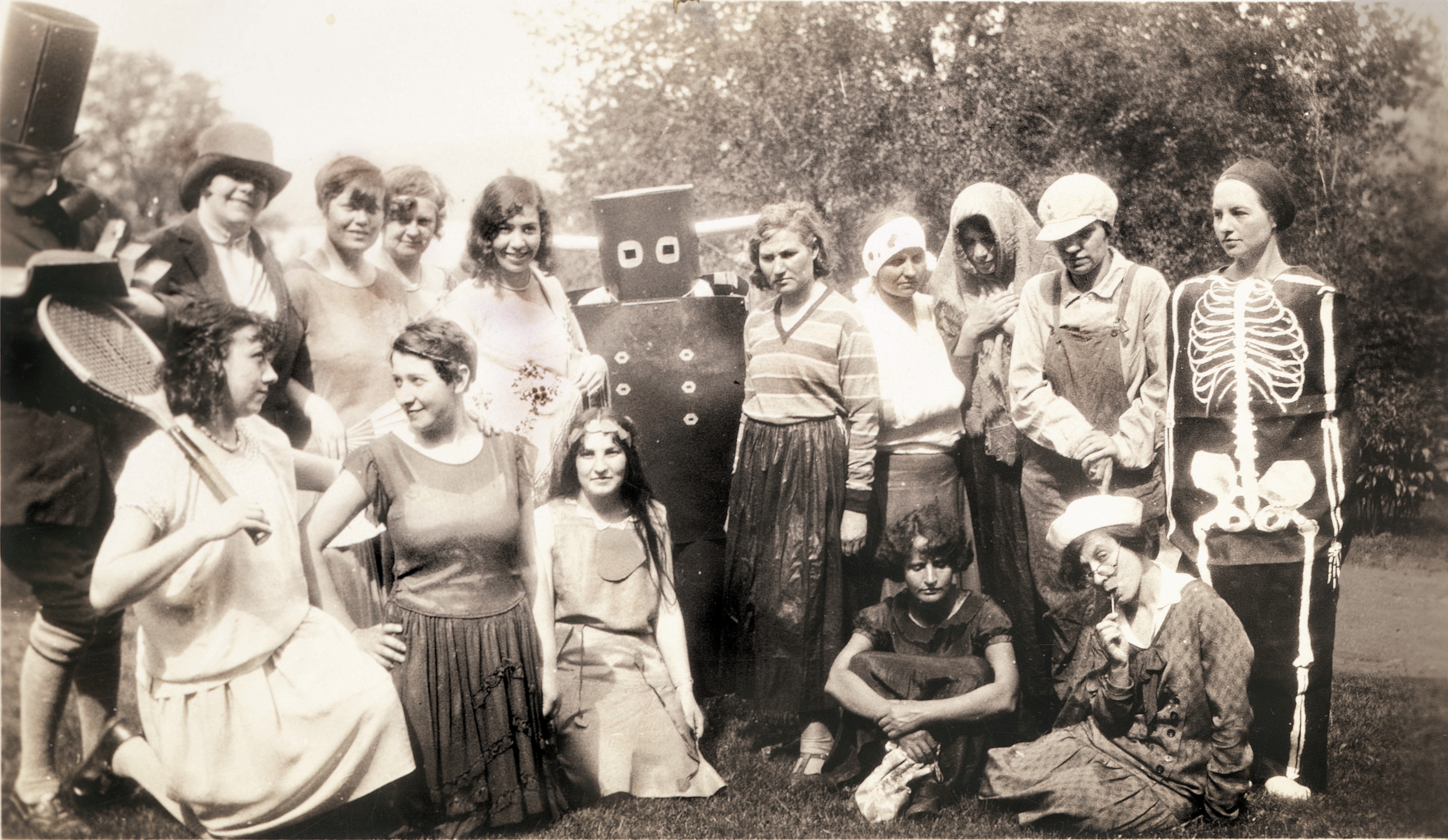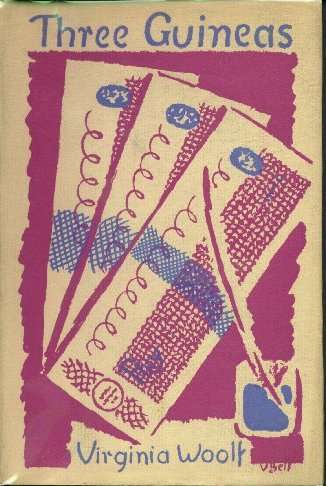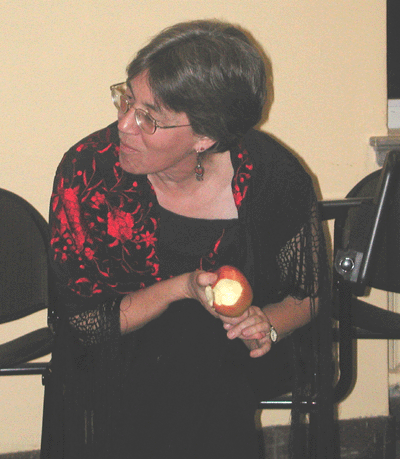Announcements:
- 4:30 p.m.Tues, Nov. 29,Thomas 224, BMC
"Transnational Feminism and Post-Socialism: A Baltic Perspective"
Irina Novikova is a Professor in the Department of Culture and
Literature and the Director of the Gender Studies Center at the
University of Latvia.
She is currently a Fulbright fellow at SUNY-Stony Brook. Her talk will
address the challenges to feminism and women's and gender studies in
Estonia, Latvia, and Lithuania in the context of post-socialism and
redefining the borders of Europe.
A reception will follow the talk in the London Room.
Sponsored by the Bryn Mawr Department of History,
the Bi-College Program in Gender and Sexuality, and
the Center for International Studies.
- confirming:
final class re-scheduled from 1-2:30, Wed, 12/7 to pizza, 5-7, Fri, 12/9?
- remaining assignments:
- writing conferences with us
- two more posts due: one this week on Va. Woolf, one next weekend on the global debate about female genital operations
- 5 p.m. Fri, 12/9: in-class panel presentation of books
- 12:30 p.m. Fri, 12/16: revised introductions and final paper on-line and portfolio, including self-evaluation) in our mailboxes
- Diversity Discussion, Fri, 12/2, 12-1, MCC:
Re-envisioning Class at Bryn Mawr and Beyond
- Stories of Teaching and Learning @ Bryn Mawr, Fri, 12/2, 2:30-4, MCC:
Case Study in Revising a Course (Neurobiology and Behavior)
Day 24: Virginia Woolf's 1938 essays, Three Guineas--
Woman's Education, Professionalization...and War-Making?

"The photo on our front cover and back covers [of the Bryn Mawr Alumnae Bulletin (November 2005)] shows students at The Bryn Mawr Summer School for Women Workers in Industry performing a skit, "Wealth and Poverty," in 1930. Opened in 1921, the School offered scholarships for programs in political economy, science and literature to factory workers until 1938. The first of its kind, it was the vision of President of the College M. Carey Thomas, who recognized the importance of women's roles in Progressive-era social reform."
This course is haunted by the ghosts of students past. A few years ago, in a course called "Major Feminist Texts of the Western Tradition," Sasha Samburg-Champion repeatedly insisted on separating feminism from other movements for social justice: this text is really about class issues, he'd say, or rights for sexual minorities, or ethnic difference. It's not about feminism. It's not about women's rights.
Virginia Woolf, as you may imagine, gave him a run for his money!
I want to start today by finding out what you are thinking--and where you are standing--on the matter of such DISTINCTIONS.
To help you figure that out, I'm distributing "guineas" (in the form of pennies) for you to engage in the same sort of "thought experiment" that Virginia Woolf conducts. She argues that three causes are identical:
- establishing a woman's college
- supporting a professional women's organization, and
- preventing war.
"The three guineas...are all given to the same cause, for the causes are the same and inseparable" (144). I'm going to play "Study War No More" (sung by Sweet Honey in the Rock) as background, while you think through these connections for yourselves:- What is feminism to you?
- With what causes (if any) is it separable?
- To what causes will you donate your (meagre) funds?
(Bins and labels provided.)
Having taken your stands (and explained them),
let's put Woolf into conversation with both your feminist foremothers and
your own political explorations of the past few weeks:
- What is her understanding of sexual difference?
- Does she minimalize or maximize it?
- Does she see it as biological/natural/essential/socially constructed?
- What does she see happening to difference when social conditions change
(i.e., when women begin taking degrees and entering the professions)? -
Do women then lose their differentness?
- Should they?
-
Should they want to?
-
Should they try to?
Key passages from

"'we'...must differ in some essential respects from 'you,' whose body, brain and spirit have been so differently trained and are so differently influenced by memory and tradition. Though we see the same world, we see it through different eyes. Any help we can give you must be different from that you can give yourself, and perhaps the value of that help may lie in the fact of that difference." (18)
"Do we wish to join that procession, or don't we? On what terms shall we join that procession? Above all, where is it leading us, the procession of educated men?" (62)
"The professions have a certain undeniable effect upon the professors. They make the people who practise them possessive, jealous of any infringement of their rights, and highly combative. (66)
"to emphasize superiority...rouses competition and jealousy...which encourage a disposition towards war. We can refuse all such distinctions ourselves." (21)
"education, far from teaching the educated generosity and magnanimity, makes them on the contrary to anxious to keep their possessions...that they will use...much subtler methods than force when they are asked to share them? And are not force and possessiveness very closely connected with war?" (29-30)
"This is an awful mind- and soul-destroying life....Sight goes....sound goes...Speech goes...Humanity goes...Health goes...What then remains of a human being who has lost sight, sound, and sense of proportion? Only a cripple in a cave."(70-2)
"How can we enter the professions and yet remain civilized human beings...who wish to prevent war?" (75)
[Woolf ends w/ a refusal] "to be separated from the four great teachers of the daughters of educated men--poverty, chastity, derision and freedom from unreal loyalties." (79)
With those passages under our belts/ringing in our ears,
let's return to two of (both Anne's and Virginia's) main themes:
Talking/thinking notes
Woolf is skeptical about legislative change
equal rights and political feminism were not her arenas
1919 Sex Disqualification Act (=women not excluded from public functions).
Virginia Woolf affirms female differentness, female otherness as culturally constructed, not natural
she argues that women's historical exclusion from positions of power (our outsidedness, our liminality)
can be a site of criticism, a source for change, that the value of our help is in our differentness,
that having been excluded gives us a perspective that can be illuminating,
that illuminates in particular the idea that we will never end war
til we understand the desire for dominance at all levels.
There are limits to her vision, to her "outsider's society":
she writes with the hauteur of the privileged woman--
certainly exhibits no solidarity w/ the working class--
she also claims none.
Lots of feminists use the word "woman" as a universal category
(remember Ortner's analysis about the problem of the category?).
Woolf is unusually precise in her use of categories:
she speaks only about the "daughters of educated men";
she was aware that she was not representative of all women
(an ungenerous reading would be that this
just gives her an alibi for not thinking about others,
those maids in private houses that were so imprisoning for wealthy women).
(Bringing it home...)
Joseph Taylor directed in his will that his money be used to erect buildings "for the comfort and
advanced education and care of young women, or girls of the higher classes of society."
From the College Archives
Elizabeth Mosier '84 and Creative Writing instructor
"Campus Life," Bryn Mawr College Homepage, accessed 4/3/00:
What I felt from the moment I stepped through Pembroke Arch was that Bryn Mawr College was for me. It was the "room of one's own" that Virginia Woolf had counseled me to find. And in finding it at this women's college, I was surprised to discover that here, my gender wasn't the most noteworthy thing about me. For the first time in my life, the fact that I'm intelligent wasn't met with great surprise. At Bryn Mawr, it was quietly expected that I would go beyond what others had assumed were my limitations, laid on me with the parenthetical phrases following every accolade: "That's good work--or writing or reading--(for a girl)."
Does providing "a room of one's own" seem to you
a vision adequate as to guide a women's college?
How about this, as an alternative?
E-mail to my class, 4/17/00
"Virginia Woolf would be happy":
Virginia Woolf would be happy, I think, to know of the news in this Sunday's NYT (4/16/00): "In the largest donation ever to a woman's college, a New York couple has given $25 million to Wellesley College. The gift from Anthony Wang and his wife, Lily...was announced as the college began a five-year campaign to raise $400 million, the most ambitious fund-raising goal ever set by a woman's college...since women have traditionally lagged behind men in charitable giving, women's colleges have had less success than coeducation institutions in fund-raising...Wellesley's president said the gift from the Wangs "shattered that shibboleth. This says women are loyal and they care, and they care about causes that have to do with women and the institutions that help women to make a difference in the world," she said. 'When we pull this campaign off, it will say that women are every bit as capable of raising money to support an institution they love as men are. We don't have to think of them as any less capable in that realm any more than we have to think of them as less capable in any other realm.'"
Does saying that "women are every bit as capable of raising money
to support an institution that they love"
seem to you a good end for women's education?
Might we re-conceive our work on larger terms,
as installing multiple different sorts of women in the public sphere?
Am I pushing too hard?
(Placing too many peas in the featherbed?)

Kelsey: I find it disturbing to follow her arguments....the 'educated' seem to advocate peace much more than the "non-educated"
....Very few of the educated elite, who strive to protect "culture and intellectual liberty," would ever dream of enlisting into the armed forces....within these elite structures, anti-war sentiment has vastly increased from the 1930šs....the egalitarian society that she promotes will always be tied to class more than gender.
Patricia : I felt that she presents an interesting idea about resistance to discourse. "But as a result the answer to your question must be that we can best help you prevent war not by repeating your words and following your methods but by finding new words and creating new methods. We can best help you to prevent war not by joining your society but by remaining outside your society but in co-operation with its aim." (pp. 143) She seems to be suggesting a "pleasure-dome"...introducing a new discourse...
I found Woolf's sense of humor extremely amusing....
I felt as though this book was written in a way that exuded confidence in a way that felt like it was coming from a man...Even the lack of paragraphs--no real stops between ideas--but it was like a contained and more "logical" version of Molly's chapter in "Ulysses". There was something powerful--even "masculine" about her writing--that I feel as though she planned in some way.
Return to Syllabus







